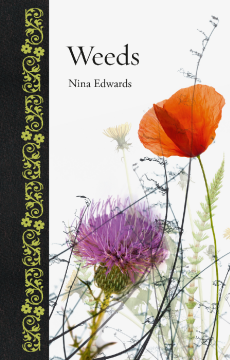
Additional Information
Book Details
Abstract
We spray them, pluck them, and bury them under mulch; and we curse their resilience when they spring back into place. To most of us, weeds are a nuisance, not worth the dirt they are growing in. But the fact is weeds are a plant just like any other, and it is only we who designate them as a weed or not, as a plant we will dote over or one we will tear out of the earth with abandon. And as Nina Edwards shows in this history, that designation is constantly changing. Balancing popular history with botanical science, she tells the story of the lowly, but proud, weed.
As Edwards shows, the idea of the weed is a slippery one, constantly changing under different needs, fashions, and contexts. In a tightly controlled field of corn, a scarlet poppy is a bright red intruder, but in other parts of the world it is an important cultural symbol, a potent and lucrative pharmaceutical source, or simply a beautiful, lakeside ornament. What we consider a pest—Aristolochia Rotunda, or “fat hen”—was, in Neolithic times, a staple crop, its seeds an important source of nutrition. Sprinkled with personal anecdotes and loads of useful information, Weeds sketches history after history of the fashions and attitudes that have shaped our gardens, showing us that it is just as important what we keep out of them as what we put in, and that just because we despise one species does not mean that there haven’t been others whose very lives have depended on it.
“Edwards takes the reader through the history of weeds and their history in art. . . . The book is copiously illustrated with paintings and prints. . . . The narrative creeps through husbandry, gardening, poetry, food, medicine, and apocalypse. . . . From the Bible to Shakespeare, weeds manifest failure, weakness, sexuality, romanticism, freedom, lack of freedom, equality—you name it. . . . Weeds makes you think about our combat with plants, always one step ahead, without sentiment.”
— Sunday Telegraph
“What is a weed? Now I’ve read this charming little book, I feel confident that I could have a solid debate about this with the best of them. Who’d have thought the topic of weeds could be so interesting and thought-provoking? Even non-gardeners would enjoy this book, as weeds are presented as part of everyday life, from cookery to medicine to art. . . . This is an unexpectedly great read, which leaves you with the thought: ‘What would the world be without weeds?’’
— English Garden
“This latest in Reaktion’s Botanical series, which is an engaging amalgam of natural and cultural history, is well suited to such treatment because it focuses on plants that have been our companions since our species first began to leave its mark on the planet, such as goosegrass and darnel (the ‘tares’ mentioned in the Bible). Reading Nina Edwards’s entertaining account of their place in our fields, cities, art, and even diet gave me a new respect for these resilient plants.”
— BBC Wildlife Magazine
“Is it a weed? Good question. Nina Edward’s main point in this well-written book is that it all depends on what you mean. . . . There is plenty more of this food for thought here—and, indeed, some food for eating. Recipes are given for ground-elder quiche and dandelion fritters. . . . All this dense discussion is thought-provoking.”
— Country Life
“Cow parsley in a flower arrangement, nettle soup, dandelion and burdock to drink, tansy for a cough or convolvulus strangling the plants in our borders, burrs sticking to our clothes, thistles scratching our legs on a public footpath. . . . Weeds are, to put it mildly, controversial. In Weeds Nina Edwards has considered all these and many, many more aspects of weeds in a detailed examination of the outcasts of the plant world. While I enjoy nothing more than a good gardening book, it had never occurred to me that weeds could be the subject of such a beautiful and fascinating volume.”
— Methodist Recorder
Nina Edwards is a freelance writer who lives in London. She is the author of Offal: A Global History, also published by Reaktion Books.
